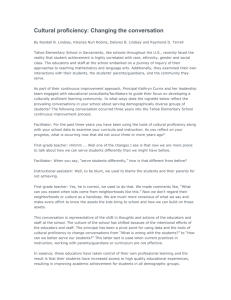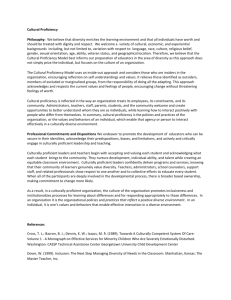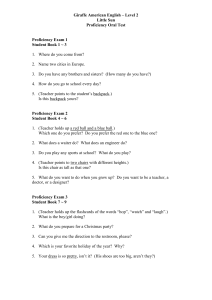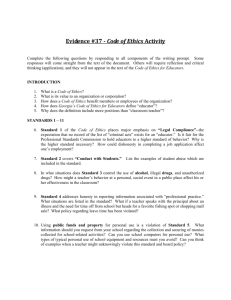Reflections of Course-based Embedded Assignments
advertisement
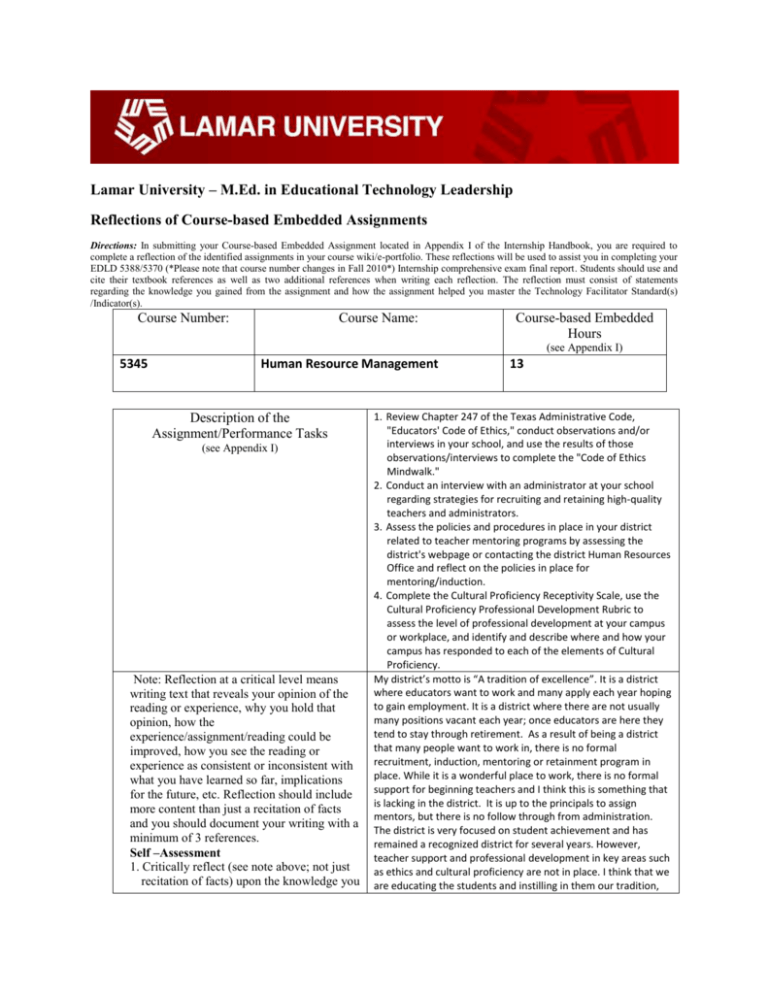
Lamar University – M.Ed. in Educational Technology Leadership Reflections of Course-based Embedded Assignments Directions: In submitting your Course-based Embedded Assignment located in Appendix I of the Internship Handbook, you are required to complete a reflection of the identified assignments in your course wiki/e-portfolio. These reflections will be used to assist you in completing your EDLD 5388/5370 (*Please note that course number changes in Fall 2010*) Internship comprehensive exam final report. Students should use and cite their textbook references as well as two additional references when writing each reflection. The reflection must consist of statements regarding the knowledge you gained from the assignment and how the assignment helped you master the Technology Facilitator Standard(s) /Indicator(s). Course Number: Course Name: Course-based Embedded Hours (see Appendix I) 5345 Human Resource Management Description of the Assignment/Performance Tasks (see Appendix I) Note: Reflection at a critical level means writing text that reveals your opinion of the reading or experience, why you hold that opinion, how the experience/assignment/reading could be improved, how you see the reading or experience as consistent or inconsistent with what you have learned so far, implications for the future, etc. Reflection should include more content than just a recitation of facts and you should document your writing with a minimum of 3 references. Self –Assessment 1. Critically reflect (see note above; not just recitation of facts) upon the knowledge you 13 1. Review Chapter 247 of the Texas Administrative Code, "Educators' Code of Ethics," conduct observations and/or interviews in your school, and use the results of those observations/interviews to complete the "Code of Ethics Mindwalk." 2. Conduct an interview with an administrator at your school regarding strategies for recruiting and retaining high-quality teachers and administrators. 3. Assess the policies and procedures in place in your district related to teacher mentoring programs by assessing the district's webpage or contacting the district Human Resources Office and reflect on the policies in place for mentoring/induction. 4. Complete the Cultural Proficiency Receptivity Scale, use the Cultural Proficiency Professional Development Rubric to assess the level of professional development at your campus or workplace, and identify and describe where and how your campus has responded to each of the elements of Cultural Proficiency. My district’s motto is “A tradition of excellence”. It is a district where educators want to work and many apply each year hoping to gain employment. It is a district where there are not usually many positions vacant each year; once educators are here they tend to stay through retirement. As a result of being a district that many people want to work in, there is no formal recruitment, induction, mentoring or retainment program in place. While it is a wonderful place to work, there is no formal support for beginning teachers and I think this is something that is lacking in the district. It is up to the principals to assign mentors, but there is no follow through from administration. The district is very focused on student achievement and has remained a recognized district for several years. However, teacher support and professional development in key areas such as ethics and cultural proficiency are not in place. I think that we are educating the students and instilling in them our tradition, gained from the assignment. (3 Points) 2. Critically reflect upon the relationship between any new information you gained from the assignment with old information you previously held to be true. (2 Points) 3. How did the relationship between the old and new information you learned affect your personal experience with the assignment? (2 Points) Learn as a Learner 1. Critically reflect (see note above; not just recitation of facts) upon your approach and strategies used in completing the assignment. (3 Points) 2. Critically reflect upon how you learn as a learner and how you assess your own performance in completing the assignment(s). (2 Points) 3. How did your learning and interaction with colleagues (such as discussion forum, web conferences, wiki and blog participation, etc.) affect the results of your performance? (2 Points) Lifelong Learning Skills 1. Critically reflect (see note above; not just recitation of facts) upon what you gained about learning and how you learn that will impact your future learning. (3 Points) 2. How will your past interactions and collaborations with colleagues impact your future learning experiences? (2 Points) 3. As a lifelong learner, what questions or issues challenge you and are worthy of future research or investigation? (2 Points) Additional Criteria 1. Content posted to e-Portfolio wiki/blog/Google site (1 Point) 2. Mechanics (1 Point) 3. APA Format (1 Point) 4.Minimum of 3 References (1 Point) all the while leaving the teachers behind. It will be important for me as a principal to make certain that the teachers on my campus are supported in their first year of teaching. Vogel confirms that to keep beginning teachers it is critical to help them succeed and gain the confidence necessary to continue teaching (2006). As an administrator, I would want to change the policies regarding teacher induction and mentoring to make them more comprehensive for our teachers. The “Code of Ethics Mindwalk” was a good exercise in reminding me what acceptable water cooler conversation is and what it is not. Too often teachers converse about students and discuss things related to the students that should be kept confidential. Personally I had not read the TAC Code of Ethics since completing coursework for my certification ten years ago. Since then the ethics code has been revised and had I not done this assignment I would not have known that. This assignment gave me pause to reflect on what I discuss regarding students and whom I discuss it with. I feel that because of this I will review the code of ethics annually and would urge other educators to do the same. Cultural proficiency was a new concept introduced to me through the completion of this assignment. I knew it was important to be aware of cultural differences, but had not considered that my actions and expectations in the classroom may contradict what is practiced at home in regards to cultural preferences and ideas. According to Nuri-Robins, Lindsey, Terrell and Lindsey schools and educators must change how we respond to cultural differences in order to adapt to the shifting demographics in society (2007). I have realized that to become more proficient I must find more ways to educate myself on cultural differences. My district provides rudimentary cultural diversity training for its administrators, but provides nothing for the teachers. It is important to aspire to become culturally proficient in order to connect with the parents of our culturally diverse students and get them involved. We need to be able to identify the strengths and opportunities that our culturally diverse parents can provide for our students (Colombo, 2006). I think that completing this assignment has encouraged me to seek further professional development in order to increase my cultural proficiency. Colombo, M. W. (2006). Building school partnerships with culturally and linguistically diverse families. Phi Delta Kappan, 88(4), 314-318. (Maximum 25 points) Nuri-Robins, K., Lindsey, D.B., Terrell, R.D., & Lindsey, R.B. (2007). Cultural proficiency: Tools for secondary school administrators. Principal Leadership, 8(1), 16-22. Vogel, T. (2006). The principles role in teacher retention. National Association of Elementary School Principles: NAESP, Principal, 85(3).

